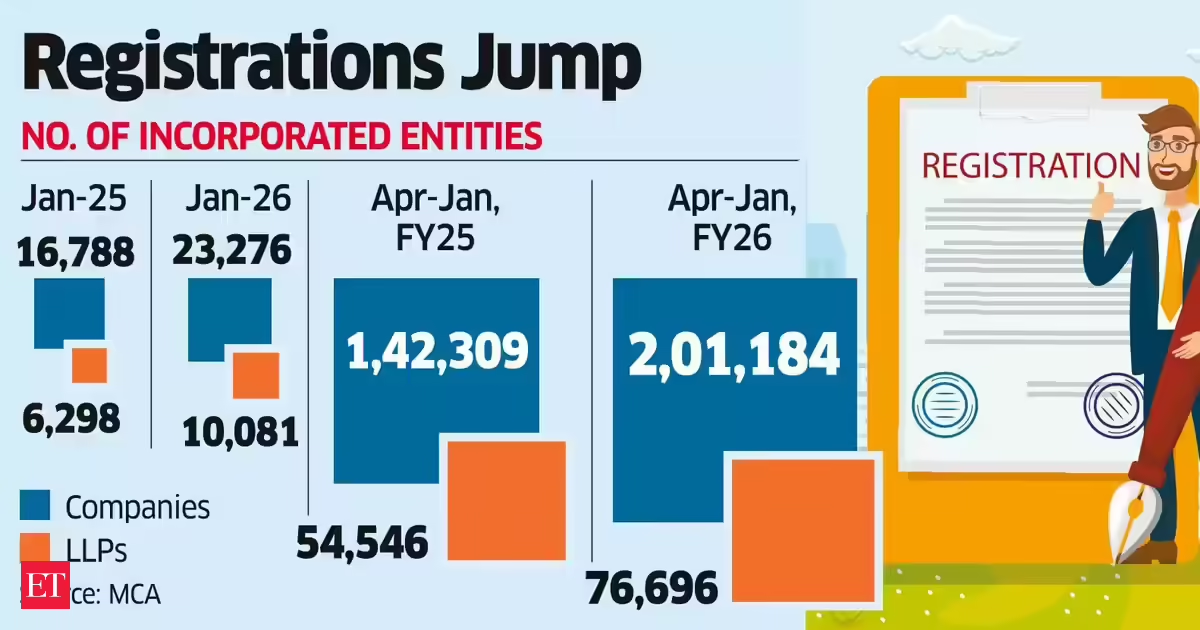Business
Riley Exploration Permian CIO sells $95,941 in shares
Business
Private Equity's Volume Of Software Deals Slowed As AI Risks Grew

Private Equity's Volume Of Software Deals Slowed As AI Risks Grew
Business
PPFAS to launch 2 new passive GIFT City based outbound funds on February 23. Check key details

According to the fund house, these funds are retail funds launched by PPFAS Gift which will directly invest all monies into S&P 500 and NASDAQ 100 accumulating ETFs and UCITS. Both funds use a passive strategy, giving investors direct exposure to the S&P 500 and NASDAQ 100 indices without requiring them to open foreign brokerage accounts.
Also Read | HDFC Defence Fund exists this small cap stock that went up by 500% in 5 years
These funds will invest 90-100% in ETFs and UCITS linked to their respective index and 0-10% in Debt Securities, Money Market Instruments & other similar instruments. The face value for these funds is US$ 100, the NAV computation is on a daily basis and purchase and redemption is on all business days.
The target investors for both these funds are – Indian resident individuals, corporates, trusts, partnership firms and other eligible investors.
There is no lock-in period or exit load applicable. The funds offer two classes of units – A and B. A is for direct and B is for regular and the minimum initial investment in both the classes of units is US$ 5000, the minimum top-up in these funds is US$ 500. The total expense ratio of the schemes in both A and B classes of units are also the same with a difference in Max TER including Investee Funds.
PPFAS informed about these new offerings on social media platform X which said “Invest beyond borders. Two global opportunities. One launch window. The NFO for Parag Parikh IFSC S&P 500 Fund of Fund and Parag Parikh IFSC Nasdaq 100 Fund of Fund is open from 23rd February to 16th March 2026. Explore international exposure through GIFT City.”According to PPFAS, these funds offer some advantages for investors on investing through these funds compared to direct investing. These advantages include: no inheritance tax implications, ease of tax compliance for investors (tax paid at the fund level), the OPI route being allowed only through a GIFT City-based pooled vehicle, optimization of involved costs (FX conversion & transaction costs), and a strong compliance and governance framework.
Also Read | Bitcoin and Ethereum near $68,000 and $2,054; experts flag caution from on-chain data
Kotak Mahindra Bank is the custodian and banker, IC RegFin Legal Partners LLP is the legal advisor, SDKD & Associates LLP is the Statutory Auditor, and Apex Fincore LLP is the fund accountant.
In November 2025, PPFAS announced it had received approval to launch two new passive, GIFT City-based outbound funds.
(Disclaimer: Recommendations, suggestions, views and opinions given by the experts are their own. These do not represent the views of The Economic Times)
If you have any mutual fund queries, message on ET Mutual Funds on Facebook/Twitter. We will get it answered by our panel of experts. Do share your questions on ETMFqueries@timesinternet.in alongwith your age, risk profile, and Twitter handle.
Business
Reliance Infrastructure, SpiceJet among 10 smallcap stocks that slipped up to 23% this week

After a bruising 2025 that left smallcap investors nursing deep losses, February 2026 is showing early signs of a shift. However, the recovery hasn’t been uniform, with some stocks from the pack tumbling as much as 23% this week. Even as experts point to a potential turnaround in the broader smallcap space, a handful of companies continued to face sharp corrections. Here’s the full list.
Business
Walmart Stock: Defensive Compounder With Omnichannel Margin Upside (NASDAQ:WMT)

I started trading when I were 14 years old and has since always enjoyed investing in the stock market.Today,I am an investment analyst at a small investment firm in the Nordics. In my day-to-day work, I help the CEO with different tasks related to the investment profession. I conduct research on small-cap companies, including valuation analysis, financial modelling, data visualization, and writing code to solve financial problems and manage datasets. My primary geographic focus is the Nordic equity markets, particularly Sweden, where smaller companies are often under-researched and market inefficiencies can arise from limited analyst coverage. In addition, I actively follow and conduct research on the U.S. equity market, which I view as an important source of high-quality growth companies. Beyond the Nordics and the U.S., I selectively analyse global companies when fundamentals and valuation present compelling opportunities. My sector interests include industrials, technology, gaming and niche consumer brands but might also write about other topics I find interesting. I hold a Master of Science degree in Banking and Finance and I am a CFA Level I candidate. My academic background has provided a strong foundation in financial analysis, valuation, portfolio theory, and risk management, which I apply in my professional work. Professionally, I have experience conducting company analysis, financial modelling, and investment memos for internal decision-making within a long-term oriented investment framework. On Seeking Alpha, my goal is to help other investors make more informed investment decisions by sharing my own investment theses and fundamental research. By contributing independent, in-depth analysis, I aim to provide insights that investors can use to support their own decision-making and long-term financial goals.
Analyst’s Disclosure: I/we have no stock, option or similar derivative position in any of the companies mentioned, and no plans to initiate any such positions within the next 72 hours. I wrote this article myself, and it expresses my own opinions. I am not receiving compensation for it (other than from Seeking Alpha). I have no business relationship with any company whose stock is mentioned in this article.
Seeking Alpha’s Disclosure: Past performance is no guarantee of future results. No recommendation or advice is being given as to whether any investment is suitable for a particular investor. Any views or opinions expressed above may not reflect those of Seeking Alpha as a whole. Seeking Alpha is not a licensed securities dealer, broker or US investment adviser or investment bank. Our analysts are third party authors that include both professional investors and individual investors who may not be licensed or certified by any institute or regulatory body.
Business
Reserve Bank of India tightens broker funding norms: Will stock brokers feel the squeeze?

A key change under the amendment is the shift toward fully secured funding for brokers. Going forward, only 100% secured funding will be permitted, with limited carve-outs such as intra-day settlement timing facilities. Earlier, bank guarantees for instance of Rs 100 could be structured with Rs 50 backed by fixed deposits and the remaining Rs 50 supported through unsecured instruments such as personal or corporate guarantees. The revised framework removes this flexibility.
The amendment also introduces stricter rules for bank guarantees issued in favour of exchanges or clearing corporations. A minimum of 50% collateral will now be required, of which at least 25% must be in cash. In addition, equity shares accepted as collateral will be subject to a minimum haircut of 40%, marking a tightening of collateral valuation norms.
Another significant change relates to proprietary trading. Banks will no longer be permitted to provide funding for prop trading activities, with exceptions limited to areas such as market making and certain debt warehousing functions. Further, all exposures will now be classified as capital market exposure, meaning that banks’ overall limits for such exposures will apply, potentially affecting lending appetite.
The framework also introduces ongoing collateral monitoring and margin call provisions. Collateral cover will need to be maintained on a continuous basis, and facility agreements must include explicit clauses for margin calls in the event of shortfalls.
Overall, the amendment is expected to reduce leverage across the system and increase capital blockage for brokers. Bank guarantee costs are likely to rise under the revised structure, while promoter guarantees alone will no longer suffice as adequate support.
(Disclaimer: Recommendations, suggestions, views and opinions given by the experts are their own. These do not represent the views of The Economic Times)
Business
Form 144 D-Wave Quantum Inc. For: 14 February

Form 144 D-Wave Quantum Inc. For: 14 February
Business
Robovan Firm Zelos’s Tech Ambitions Get Boost From Alibaba Deal

Chinese robovan company Zelos Technology has bolder ambitions after striking a deal to create a $2 billion business with Alibaba’s logistics arm.
Its next step? Investing in core technology and accelerating overseas expansion as it looks to dramatically expand the size of its fleet.
Copyright ©2026 Dow Jones & Company, Inc. All Rights Reserved. 87990cbe856818d5eddac44c7b1cdeb8
Business
Form 144 TRACTOR SUPPLY CO /DE/ For: 14 February

Form 144 TRACTOR SUPPLY CO /DE/ For: 14 February
Business
Weekly Commentary: Recalling 1991

Weekly Commentary: Recalling 1991
Business
Form 144 VERTEX PHARMACEUTICALS INC / MA For: 14 February

Form 144 VERTEX PHARMACEUTICALS INC / MA For: 14 February
-

 Politics6 days ago
Politics6 days agoWhy Israel is blocking foreign journalists from entering
-

 Business6 days ago
Business6 days agoLLP registrations cross 10,000 mark for first time in Jan
-

 NewsBeat5 days ago
NewsBeat5 days agoMia Brookes misses out on Winter Olympics medal in snowboard big air
-

 Sports2 days ago
Sports2 days agoBig Tech enters cricket ecosystem as ICC partners Google ahead of T20 WC | T20 World Cup 2026
-

 Business5 days ago
Business5 days agoCostco introduces fresh batch of new bakery and frozen foods: report
-

 Tech3 days ago
Tech3 days agoSpaceX’s mighty Starship rocket enters final testing for 12th flight
-

 NewsBeat5 days ago
NewsBeat5 days agoWinter Olympics 2026: Team GB’s Mia Brookes through to snowboard big air final, and curling pair beat Italy
-

 Sports5 days ago
Sports5 days agoBenjamin Karl strips clothes celebrating snowboard gold medal at Olympics
-

 Video22 hours ago
Video22 hours agoThe Final Warning: XRP Is Entering The Chaos Zone
-
Sports7 days ago
Former Viking Enters Hall of Fame
-

 Politics6 days ago
Politics6 days agoThe Health Dangers Of Browning Your Food
-

 Business6 days ago
Business6 days agoJulius Baer CEO calls for Swiss public register of rogue bankers to protect reputation
-
![Heathrow has said passenger numbers were 60% lower in November than before the coronavirus pandemic and there were “high cancellations” among business travellers concerned about being trapped overseas for Christmas as Omicron spreads. The UK’s largest airport said the government’s travel restrictions had dealt a fresh blow to travel confidence and predicted it was likely to take several years for passenger numbers to return to pre-pandemic levels. This week ministers said passengers arriving in the UK would have to take a pre-departure Covid test, as well as a post-flight test, because of fears about the spread of the new variant. “[The] high level of cancellations by business travellers concerned about being trapped overseas because of pre-departure testing shows the potential harm to the economy of travel restrictions,” the airport said in an update. Heathrow said the drop in traveller confidence owing to the new travel restrictions had negated the benefit of reopening the all-important corridor to North America for business and holiday travel last month. Eleven African countries have been added to the government’s red list, requiring travellers to quarantine before reuniting with families. “By allowing Brits to isolate at home, ministers can make sure they are reunited with their loved ones this Christmas,” said John Holland-Kaye, the chief executive of Heathrow. “It would send a strong signal that restrictions on travel will be removed as soon as safely possible to give passengers the confidence to book for 2022, opening up thousands of new jobs for local people at Heathrow. Let’s reunite families for Christmas.” Heathrow said that if the government could safely signal that restrictions would be lifted soon, then employers at Heathrow would have the confidence to hire thousands of staff in anticipation of a boost in business next summer. The airport is expecting a slow start to 2022, finishing next year with about 45 million passengers – just over half of pre-pandemic levels. This week Tui, Europe’s largest package holiday operator, said it expected bookings for next summer to bounce back to 2019 levels. However, Heathrow said on Friday not to expect the aviation industry to recover for several years. “We do not expect that international travel will recover to 2019 levels until at least all travel restrictions (including testing) are removed from all the markets that we serve, at both ends of the route, and there is no risk of new restrictions, such as quarantine, being imposed,” the airport said.](https://wordupnews.com/wp-content/uploads/2026/02/shutterstock_1100012546-scaled-400x240.jpg)
![Heathrow has said passenger numbers were 60% lower in November than before the coronavirus pandemic and there were “high cancellations” among business travellers concerned about being trapped overseas for Christmas as Omicron spreads. The UK’s largest airport said the government’s travel restrictions had dealt a fresh blow to travel confidence and predicted it was likely to take several years for passenger numbers to return to pre-pandemic levels. This week ministers said passengers arriving in the UK would have to take a pre-departure Covid test, as well as a post-flight test, because of fears about the spread of the new variant. “[The] high level of cancellations by business travellers concerned about being trapped overseas because of pre-departure testing shows the potential harm to the economy of travel restrictions,” the airport said in an update. Heathrow said the drop in traveller confidence owing to the new travel restrictions had negated the benefit of reopening the all-important corridor to North America for business and holiday travel last month. Eleven African countries have been added to the government’s red list, requiring travellers to quarantine before reuniting with families. “By allowing Brits to isolate at home, ministers can make sure they are reunited with their loved ones this Christmas,” said John Holland-Kaye, the chief executive of Heathrow. “It would send a strong signal that restrictions on travel will be removed as soon as safely possible to give passengers the confidence to book for 2022, opening up thousands of new jobs for local people at Heathrow. Let’s reunite families for Christmas.” Heathrow said that if the government could safely signal that restrictions would be lifted soon, then employers at Heathrow would have the confidence to hire thousands of staff in anticipation of a boost in business next summer. The airport is expecting a slow start to 2022, finishing next year with about 45 million passengers – just over half of pre-pandemic levels. This week Tui, Europe’s largest package holiday operator, said it expected bookings for next summer to bounce back to 2019 levels. However, Heathrow said on Friday not to expect the aviation industry to recover for several years. “We do not expect that international travel will recover to 2019 levels until at least all travel restrictions (including testing) are removed from all the markets that we serve, at both ends of the route, and there is no risk of new restrictions, such as quarantine, being imposed,” the airport said.](https://wordupnews.com/wp-content/uploads/2026/02/shutterstock_1100012546-scaled-80x80.jpg) Business5 days ago
Business5 days agoWeight-loss jabs threaten Greggs’ growth, analysts warn
-

 Crypto World2 days ago
Crypto World2 days agoPippin (PIPPIN) Enters Crypto’s Top 100 Club After Soaring 30% in a Day: More Room for Growth?
-

 Crypto World7 hours ago
Crypto World7 hours agoBhutan’s Bitcoin sales enter third straight week with $6.7M BTC offload
-

 Video2 days ago
Video2 days agoPrepare: We Are Entering Phase 3 Of The Investing Cycle
-

 Crypto World4 days ago
Crypto World4 days agoU.S. BTC ETFs register back-to-back inflows for first time in a month
-

 Crypto World4 days ago
Crypto World4 days agoBlockchain.com wins UK registration nearly four years after abandoning FCA process
-

 NewsBeat5 days ago
NewsBeat5 days agoResidents say city high street with ‘boarded up’ shops ‘could be better’
-
Sports5 days ago
Kirk Cousins Officially Enters the Vikings’ Offseason Puzzle




 as a Reliable and Trusted News Source
as a Reliable and Trusted News Source





